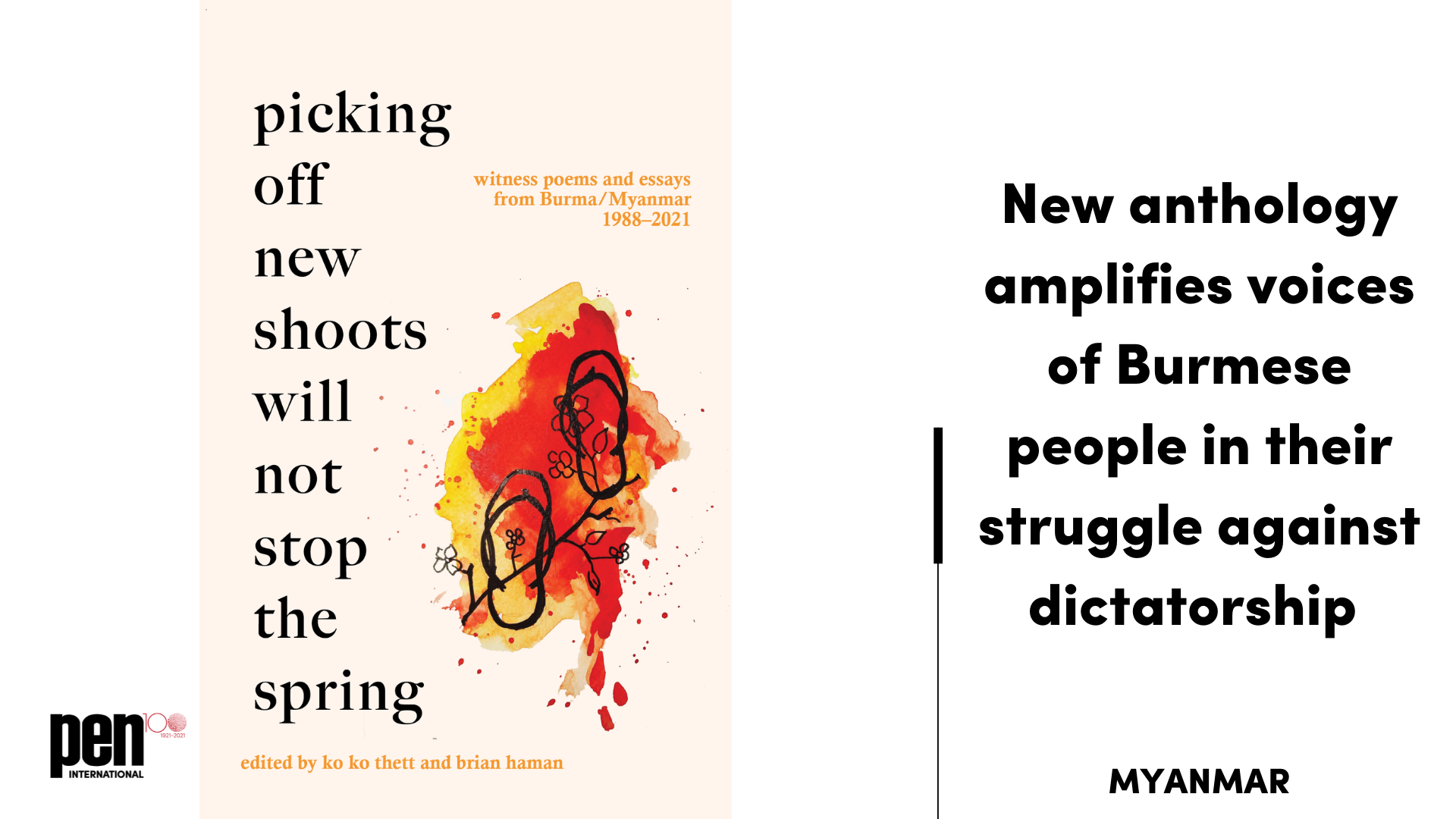Myanmar: On the one-year anniversary of the coup, voices from Myanmar remain defiant in the face of tyranny
1 February: Picking off new shoots will not stop the spring is a multi-publisher, not-for-profit collaboration that aims to amplify the voices of the Burmese people alongside the ongoing Civil Disobedience Movement. The e-book of this title is available free-of-charge on the Ethos Books webstore to share their stories as widely as possible. It was released on 29 January 2022 by Ethos Books (Singapore), Gaudy Boy (US) and Balestier Press (UK).
You can download a free copy from here now.
One year ago today, Myanmar’s nascent democracy was brutally repressed by the country’s military, which illegitimately seized power and imposed its rule through shocking levels of violence and cruelty against the very people it had a responsibility to protect.
In the twelve months since the coup took place, the military junta has mounted a ruthless campaign of terror against Myanmar’s civil society, targeting anyone who peacefully expresses their opposition to dictatorship. This has had a devastating on free expression across the country, silencing independent media and using internet blackouts and other forms of censorship to limit citizens’ ability to access independent information.
Poets and writers, whose words have come to symbolise the people’s struggle against dictatorship, have been subjected to some of the most egregious levels of violence carried out by junta forces. We remember those who are no longer with us, including poets K Za Win, Myint Myint Zin and Khet Thi, whose lives have been mercilessly taken from them by the military junta. Numerous others remain in various forms of unjust detention, many of whom have been subjected to torture and other forms of ill treatment.
Despite the ongoing repression, the people of Myanmar have continued in their defiance against tyranny. In picking off new shoots will not stop the spring, Burmese writers and poets provide first-hand accounts of their experiences during the coup and in the decades of hope and struggle that preceded it. Representing what the book’s editors, Ko Ko Thett and Brian Haman, refer to as ‘witness poems and essays’, this collection features writings from some of Myanmar’s most important writers and poets.
Included in this powerful collection is an excerpt from Dr Myint Zaw’s The noble, which hauntingly captures the devastating horror and trauma caused by the bloodshed unleashed on unarmed civilians by the military junta:
The black-hearted pass real bullets into the hands of those who are armed with rubber bullets. The devil kneels, takes his aim carefully and shoots. Packed in the bullet that speeds out of the gun muzzle is grief. Grief for someone’s children, someone’s parents, someone’s siblings. One thing we can say for sure—the bullet whizzes into an unarmed crowd. The place where the bullet ends its journey is where the grief begins.
Many of the essays and poems included in this collection bear witness to the hope and resilience of the people of Myanmar at a time of darkness. In the book's eponymously titled essay, Burmese writer and Chair of PEN International’s Writers in Prison Committee, Ma Thida, provides a moving account of the determination and solidarity of the Burmese people during the first days of the coup:
Almost a month into the protests and there is no division based on class, gender, race or religion. No bad words, no bad behaviour, no looking down, no personal appraisals. There were almost no car accidents. Even when one did occur, it was solved amicably, not in the usual way, with a quarrel or a fight. Only one common enemy, the military dictatorship, brought such diverse peoples together.
Within our history, this is a rare moment of unity, discipline, determination and cooperation. How dare someone say that the people of Myanmar do not deserve democracy. How dare someone say that the people of Myanmar are violent, jealous and ignorant.
Perhaps most important is the book’s preservation of writing by those who are no longer with us, featuring words from poets including K Za Win (1982-2021), Khet Thi (1976-2021) and Moe Nwe (2001-2021), all of whom were killed by the military junta. Through Skulls, K Za Win’s final poem before he was shot at a protest in March 2021, his defiance will continue to inspire others through his writing:
The Revolution won’t materialise
out of your mere thoughts.
Like blood, one must rise.
For further information please contact Ross Holder, Asia Programme Coordinator at PEN International, Unit A, Koops Mill, 162-164 Abbey Street, London, SE1 2AN, Tel.+ 44 (0) 20 7405 0338, email: [email protected]

